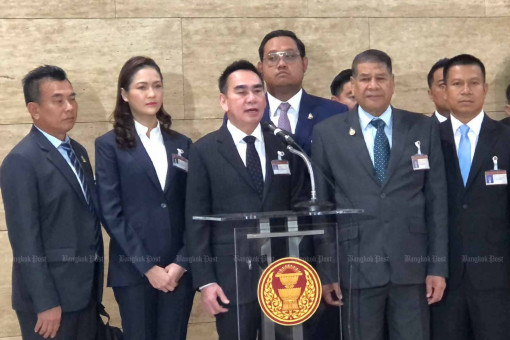Action reflected confusion over party’s stance, say members who insist they don’t want to join the government

Democrat Party MPs who voted in support of Srettha Thavisin for prime minister have blamed their action on confusion over the troubled party’s stance. They denied aspiring to be in the government and declared they were fully ready for an opposition role in parliament.
In the parliamentary vote on Tuesday to select the prime minister, 16 Democrat MPs unexpectedly voted for Mr Srettha, the Pheu Thai Party candidate. Many political observers were flabbergasted as it was understood that the party had earlier passed a resolution for its MPs to abstain.
Led by Det-it Khaothong, a caretaker deputy party leader and Songkhla MP, and Chaichana Dechdecho, a caretaker deputy secretary-general and Nakhon Si Thammarat MP, the 16 members on Thursday came out in defence of their action.
Mr Det-it told reporters that when the party held a meeting of its 25 MPs on Monday, the day before the parliamentary vote, they were split into three different groups.
Some MPs said the party should vote against Mr Srettha’s nomination, reasoning that the Democrat and Pheu Thai parties had long been in conflict. Some new MPs argued that the bitter past should be left behind, otherwise bad attitudes would persist. At this point, he said, some senior party MPs walked out of the meeting.
One group of MPs was of the opinion that the party should vote for the Pheu Thai nominee as the country had reached a dead end and there were many problems remaining to be solved.
But most of the MPs said the party should opt to abstain, he said.
Mr Det-it said that Jurin Laksanawisit, the caretaker party leader, then rose and suggested there should not be a vote on the matter because it was the individual right of an MP to vote as they wish.
“The meeting ended without a vote. We were not sure whether the party had passed a resolution or not,” he said.
Mr Det-it said that during the debate prior to the prime ministerial vote on Tuesday, the MPs in his group sat together in a separate room, listening to the comments of MPs and senators on Mr Srettha’s qualifications. Most of them found Mr Srettha acceptable to them, he added.
When it came time to vote, they noticed that Mr Jurin abstained while two other former party leaders — Chuan Leekpai and Banyat Bantadtan — voted against Mr Srettha’s nomination.
Mr Det-it said the inconsistency on the part of the three senior MPs, who are the party’s main pillars, caused MPs to conclude that the party did not have a definitive resolution regarding the vote.
‘Interest of the nation’
“We arrived at the conclusion that we should act in the interest of the nation and the people by voting in support of the Pheu Thai Party which had mustered more than 250 (MP) votes,” he said.
Pheu Thai, he noted, had also managed to reconcile with other parties that had been its political opponents in the past, notably the military-linked Palang Pracharath and United Thai Nation.
The Democrats were part of the Palang Pracharath-led coalition that formed the previous government.
“We were of the opinion that, as Democrat members of the new era who had never donned either yellow or red shirts and never had a conflict with anyone, we should not inherit the heritage of hatred and conflicts from people of the old generations,” Mr Det-it declared.
At the same time, however, he affirmed that his group of 16 MPs remained fully committed to sitting in the opposition.
“We do not aspire to be in the government. We would join a government only when we are invited and that must be a party resolution,” he said.
Asked whether the 16 MPs wanted the party to expel them so that they could join a new party, Mr Det-it said he doubted it would come to that.
“In fact, an MP can be expelled by as many as three-fourths of party MPs and executive committee members. But, since most of the MPs and party executives are here with us, I wonder how could we be expelled?” he asked.
He acknowledged what commentators have been saying for some time, that the Democrat Party was not united.
The party remains leaderless as Mr Jurin resigned following the May 14 election to take responsibility for its poor showing. It failed on two recent occasions to elect a new leader and executive board due to the lack of a quorum. In addition to the damage to its reputation, the party had to spend 3-4 million baht to arrange each meeting.
Mr Det-it urged the party to call another general assembly to elect a new leader and executive committee. And this time, he said, all sides must reconcile to ensure a sufficient quorum.

